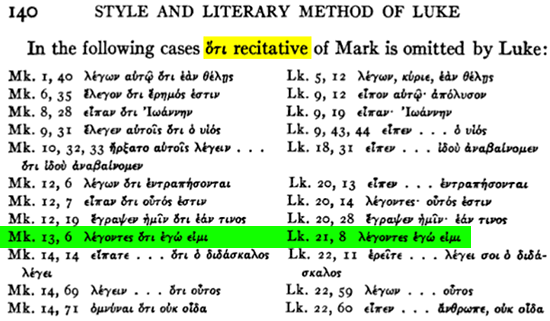The differences in translation in these texts stem from the fact that translators have followed differing Greek manuscripts, the two dominant lines of which are compared in the table below.
| Reference |
Greek Textus Receptus |
Greek Minority Texts |
| Mt. 24:5 |
πολλοὶ γὰρ ἐλεύσονται ἐπὶ τῷ ὀνόματί μου λέγοντες ἐγώ εἰμι ὁ χριστός καὶ πολλοὺς πλανήσουσιν |
πολλοὶ γὰρ ἐλεύσονται ἐπὶ τῷ ὀνόματί μου λέγοντες ἐγώ εἰμι ὁ χριστός καὶ πολλοὺς πλανήσουσιν |
| Mk. 13:6 |
πολλοὶ γὰρ ἐλεύσονται ἐπὶ τῷ ὀνόματί μου λέγοντες ὅτι ἐγώ εἰμι καὶ πολλοὺς πλανήσουσιν |
πολλο ἐλεύσονται ἐπὶ τῷ ὀνόματί μου λέγοντες ὅτι Ἐγώ εἰμι καὶ πολλοὺς πλανήσουσιν |
| Lk. 21:8 |
ὁ δὲ εἶπεν βλέπετε μὴ πλανηθῆτε πολλοὶ γὰρ ἐλεύσονται ἐπὶ τῷ ὀνόματί μου λέγοντες ὃτι ἐγώ εἰμι καί ὁ καιρὸς ἤγγικεν μὴ οὖν πορευθῆτε ὀπίσω αὐτῶν |
Ὁ δὲ εἶπεν Βλέπετε μὴ πλανηθῆτε πολλοὶ γὰρ ἐλεύσονται ἐπὶ τῷ ὀνόματί μου λέγοντες Ἐγώ εἰμι καί Ὁ καιρὸς ἤγγικεν μὴ πορευθῆτε ὀπίσω αὐτῶν |
[Note differences in bold.]
The manuscripts agree on Matthew 24:5, and almost agree on Mark 13:6, with the exception of the "gar" ("for") in the TR text. Translational differences in Mark may be related to grammatical differences between Greek and English with respect to the usage of articles, as will be explained more further below.
The Greek word "ὃτι" is the subordinating conjunction "that." This means that "saying that I am (the) Christ" would be the correct translation of the expression in this verse. The "οὖν" which occurs later, present only in the TR text, means "so" or "therefore."
Why do I place the "the" in parentheses just above?
In Greek, articles are used differently from in English. Names are commonly preceded by an article in Greek, e.g. "the John" or "the Peter" or "the Christ." Because this article may sometimes be used for other reasons than simply to denote a name, translators may find it difficult to choose whether to specify an article in English or not. For this reason, many occurrences of "the Christ" in Greek get translated simply as "Christ"; yet some retain the article in translation, i.e. "the Christ." It is important to realize this distinction between Greek and English, and the difficulty inherent to its translation when a particular one, such as THE Messiah, is referenced--where we would use "the" in English. Translators struggle with these articles, and there are times when even the word "that" may come in, as in the following two verses:
And they asked him, and said unto him, Why baptizest thou then, if
thou be not that Christ, nor Elias, neither that prophet? (John 1:25,
KJV)
And we believe and are sure that thou art that Christ, the Son of the
living God. (John 6:69, KJV)
In both of those verses above, the "that" is not technically present in Greek, but the Greek does have the definite article, as usual, before "Christ."
The original Greek had no case distinction (it was all uppercase), and it lacked punctuation (there were no quotation marks). The capitalization and quotation marks in this expression in the English translation has been added--it has no basis in the underlying text.
Conclusion
The differences in translation are on account of two main reasons. First, there are a few differences in the manuscript copies of the Greek text--accounting for the presence of "that" in Luke 21:8; and secondly, there are differences in translation that have come in as a matter of subjective interpretation on the part of the translators owing to Greek-English grammatical distinctions.

